Biden and Bibi: A bitter divorce portends trouble for Israel
It’s unlikely the personal scar tissue between Biden and Netanyahu will soon mend. The escalating war of words will impact Israel’s military strategy in Gaza.
It might be patched up functionally by Israel’s announcement that it intends to “flood Gaza with aid”, which is a statement it hasn’t made before and which may indeed revolutionise the nature of this conflict, as could renewed talk of a possible six-week ceasefire, though the situation in Gaza is fluid and intensely unpredictable.
But it’s unlikely the personal scar tissue between the two men will soon heal. Biden has said of Netanyahu’s conduct of the military campaign in Gaza that it is “hurting Israel more than helping Israel”. Senior Israeli officials have accused the Biden administration of interfering in Israeli politics. It’s the most serious spat between Washington and Jerusalem at least since Barack Obama was president – he also didn’t get on with Netanyahu – and is more vitriolic in language than the disputes were then.
Biden speaks of Netanyahu at times in the tones he normally uses for Donald Trump. He says Israel “must, must, must” do more to avoid civilian casualties. He said, in a statement captured on a hot mic, that he planned to have “a come to Jesus” meeting with Netanyahu. This particularly inapt bit of anachronistic Biden slang refers to a meeting in which the consequences of someone’s bad behaviour are laid out so starkly and threateningly that they reform.
The immediate dispute is Netanyahu’s determination that at some point the Israeli army will move into the southern Gaza city of Rafah, which has swelled in population to 1.2 million as Gazans have fled from fighting in the north. Biden agreed with an interviewer that if Israel launched a large-scale operation in Rafah, of the kind it has carried out in northern Gaza, this would cross “a red line”. “You can’t have another 30,000 Palestinians dead as a consequence of going after Hamas,” Biden said. “There are other ways to deal with Hamas.”
This was a direct intervention to forestall a big Israeli operation to clear Hamas out of Rafah. But it wasn’t just Biden having a crack at the Israeli leader. Official Washington joined in, certainly with the approval of the White House.
The annual threat assessment presented to the US Office of the Director of National Intelligence was published with public remarks saying Netanyahu would be unlikely to hold power for too long, would face large demonstrations against his rule and would be unable, as he frequently promised, to totally destroy Hamas. Vice-President Kamala Harris, in a quite odd intervention, said Americans must not equate, or conflate, the government of Israel with the people of Israel, as though the government of Israel were the moral equivalent of the mullahs of Tehran.
The most senior Jewish politician in America, Senate Majority Leader Chuck Schumer, intensified the pressure by calling on Netanyahu to hold fresh elections and Israel to change leadership.
The White House said it knew about the speech beforehand, although it had not coordinated with Schumer. Biden went on to praise the remarks, telling reporters: “He made a good speech, and I think he expressed serious concern shared not only by him, but by many Americans.”
At its worst, Washington could reduce the protection it offers Israel at the UN or even impose some conditions on the use of military equipment it supplies. Both measures are unlikely.
Netanyahu is not one to take abuse lying down, even from senior American politicians. He replied to Biden that the President was mistaken: “If he (Biden) meant that I am pursuing private policies against the wishes of the majority of Israelis, he’s wrong … These are policies supported by the majority of Israelis.”
Following publication of intelligence report statements critical of Netanyahu, a senior Israeli official, in an authorised statement, though not one that bore any official’s name, replied more robustly: “Israel is not a protectorate of the US but rather an independent and democratic country whose citizens are the ones who elect the government. We expect our friends to work to bring down the terror regime of Hamas and not the elected government of Israel.”
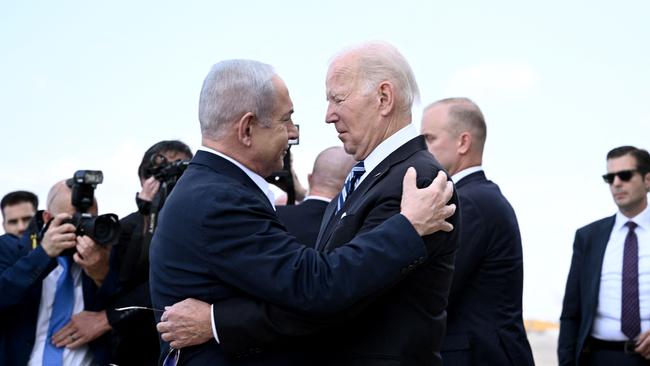
A true and sustained fracture between Washington and Jerusalem would up-end world politics. If Israel can’t rely on the US, then no US ally would ever be able to rely on Washington. Western influence in the Middle East would collapse. Worse, the world’s only Jewish state, for all its self-reliance, would be gravely imperilled.
But we’re nowhere near that situation. The dispute between the two men is actually somewhat less than meets the eye. So what does it really all mean, and what’s likely to happen next in Gaza?
The spat between Biden and Netanyahu, though not earth-shattering, is certainly serious. Biden has said things that cannot be unsaid. They play into trends in the US that are profoundly worrying for Israel.
But Biden’s purpose is clear. He’s trying to divorce Netanyahu while staying married to Israel. In some ways, Netanyahu’s international unpopularity helps Biden in this. I love Israel, I just don’t like Bibi, is his message. But Biden is surely too well informed to believe most Israelis don’t support Netanyahu’s war aims in Gaza.
Most Israelis probably agree with Biden that they’re sick of Netanyahu. At the same time, they accept that Netanyahu has made huge, historic contributions to Israel in the past, reforming its economy, starting up the start-up nation, spreading its wings diplomatically, moving Israeli political and economic engagement into Asia, generally providing for Israel’s security.
But as the nation’s leader, Netanyahu must also bear responsibility for the intelligence and operational failures that allowed Hamas to commit its shocking, evil atrocities on October 7. More than that, so much of Netanyahu’s activity in recent years has been entirely concerned with his own survival. There’s too much scandal around him, even if some of it’s trivial.
We honour your service, now get the hell out of here, seems a common Israeli view of their Prime Minister. But Biden is attacking Netanyahu on the one issue that the Israeli public overwhelmingly supports him on: the need to crush Hamas.
Washington and London have recently hosted Benny Gantz, a centrist rival to Netanyahu and the second most senior figure in Israel’s national unity government.
Everyone sees Gantz as a cuddlier figure than Netanyahu. But Gantz himself says if Israeli hostages are not released Israel will sweep through Rafah. He is just as determined as Netanyahu to destroy Hamas. After October 7, that is an overwhelming majority view among Israel’s Jewish citizens.
However, Biden’s bickering with Netanyahu may actually be good for Bibi in the short term.
Generally, an Israeli prime minister is required above all things to be able to manage the relationship with Washington. Australia is like this too, but it’s a thousand times more intense in Israel. Netanyahu got good marks for being one of the great Trump whisperers, along with Japan’s Shinzo Abe and both Malcolm Turnbull and Scott Morrison in Australia. Now Bibi presents himself as standing up for Israel, even against the Oval Office.
The political motives for Biden’s comments are obvious. No one need doubt that Biden genuinely wants to reduce the suffering of the civilian population in Gaza. Every civilised person wants that. What has been shocking has been the failure of the Western commentariat to assign significant moral responsibility to Hamas for that suffering.
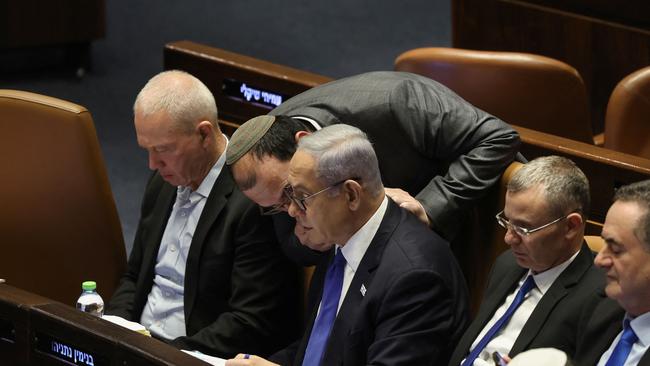
Not only did Hamas know it would provoke this suffering by its terrorist atrocities, it wanted to do that. Moreover, it continues to want that Gazan suffering to continue.
US Secretary of State Antony Blinken and National Security Adviser Jake Sullivan have made it clear it is Hamas that is preventing a six-week ceasefire coming into effect right now.If Hamas would release even 40 hostages, the women and girls, the sick and elderly and children, Israel would commit to at least a six-week ceasefire as well as releasing as many as 10 Palestinian prisoners from Israeli jails for every one Israeli hostage.
The world demands a ceasefire from Israel but Israel has been offering a ceasefire for some time.
Yet how often do we ever hear that on, for example, the ABC, to take one representative Western news outlet filled with hostility, often ignorant hostility, to Israel?
Increasingly, Arab Gulf states are pressuring Hamas to accept this ceasefire. Gulf Arab governments, much as they sympathise with the people of Gaza, overwhelmingly want Hamas neutralised, as do Egypt and Jordan.
Biden is under political pressure because of his support for Israel. Some 100,000 Democrats participating in the presidential primary in Michigan chose “uncommitted” over Biden in protest against his support for Israel. Michigan has a large Muslim minority. They mostly won’t vote for Trump come November, but if they don’t vote at all or vote for a third-party candidate they could easily cost Biden the state and even the presidency.
Independent senator Bernie Sanders and seven Democrats wrote to Biden this week urging him to stop giving military aid to Israel. They said US law prevented the administration from providing military assistance to a nation that restricted the flow of humanitarian aid. Beating up on Netanyahu while expressing loyalty to Israel itself allows Biden to accommodate some of this political pressure.
Netanyahu, for his part, needs a continuing crisis to justify staying in office. All political leaders tend to think like Trump in their innermost hearts: Only I can fix it!
Biden is 81, Netanyahu is 74. Both of them are supreme political survivors. I first met Netanyahu when, as Israel’s ambassador to the UN, he visited Australia in 1984. I first covered Biden as Washington correspondent in 1987, when he was preparing for his spectacularly unsuccessful first tilt at the Democratic nomination for president.
As so often in his prime ministership, Netanyahu’s recent words on his military intentions were almost certainly misleading in several different ways. Netanyahu talked a lot about going into Rafah, but the Israelis seem to have made few preparations to actually do so. They haven’t assembled the requisite troops, and they haven’t started moving out at least a big portion of the Gaza civilian population from Rafah, which they would have to do in advance of a military operation. Now they’re planning to “flood Gaza with aid”.
In fact the Israelis have been opening up new pathways for aid into Gaza. They support the US and other nations delivering aid by sea. They support various nations’ air drops. And they want more aid to go in by truck from Israel. But a significant portion of their own population wants Hamas to free the hostages first, so demonstrations block some aid deliveries.
To deliver aid effectively, the Israelis are looking at reanimating Palestinian Authority employees who have been on the payroll but not working since Hamas took control in 2006. Some sub-municipalities in Gaza are still functioning. And powerful Gaza family clans are operating. All of these and other structures may be used to distribute aid.
But the situation is genuinely unpredictable. Almost certainly, Israel will mount significant operations in Rafah eventually. Apart from anything else, it needs to destroy the extensive Hamas network of deep tunnels there and take control of the Gaza side of the border with Egypt to stop weapons and the like being smuggled into Gaza via that route.
‘These are the least effective of the Hamas battalions. They should be offered the real chance of surrender.’
But there are many different ways an Israeli operation could unfold. The best analysts think it won’t happen before the end of the Muslim fasting month of Ramadan, on April 8. The Americans have indicated they would support Israeli operations that are targeted and look like counter-terrorism, or that have sufficient safeguards to minimise civilian casualties.
Dennis Ross, the veteran US Middle East negotiator and analyst, reports that Israel believes it has effectively destroyed 18 of Hamas’s 24 combat battalions. Six Hamas battalions remain in Rafah, mainly hiding in tunnels. Hamas leader Yahya Sinwar is there somewhere, deep underground, almost certainly surrounded by Israeli hostages.
Ehud Yaari, Israel’s best informed and shrewdest strategic analyst, has a suggestion, which he shares with the Australian.
“These are the least effective of the Hamas battalions,” he says. “They should be offered the real chance of surrender.”
It’s unlikely that any Gulf Arab state would let them take up residence, but perhaps Algeria, perhaps Iran. It’s an unlikely plan altogether but it’s worth a try because it would certainly avoid bloodshed.
However, almost every section of Israeli political and social opinion is determined that Hamas battalions in Rafah will not be allowed to remain intact, constitute a surviving Hamas institution, and menace Israel in the future.
Yaari estimates that 19 of Hamas’s 24 battalions are no longer functioning militarily; that’s one more not functioning than Ross suggests. That doesn’t mean all the Hamas fighters in those battalions have been killed, captured or disarmed. There are still some squads with weapons, some smaller formations. But as battalions they’re defunct.
Netanyahu not only over-promoted the idea that the Israeli army would soon be going into Rafah, he also oversold the idea that Israel could completely destroy Hamas. This is an old pattern from Netanyahu. Most of the time he has been Prime Minister he has been half threatening various military actions, but almost always not taking them.
He has made countless explicit and implicit threats to bomb Iran’s nuclear program but never did so. His affect of deterrence and menace was once a strategic asset. That’s gone after October 7. And with Hamas, it’s generally impossible to completely destroy any insurgency.
But depending on the extent of Israel’s military success, Jerusalem will not then be fighting a well-equipped terrorist army, as Hamas had become before October 7, but rather an extreme Islamist terrorist group with sporadic terror capabilities.
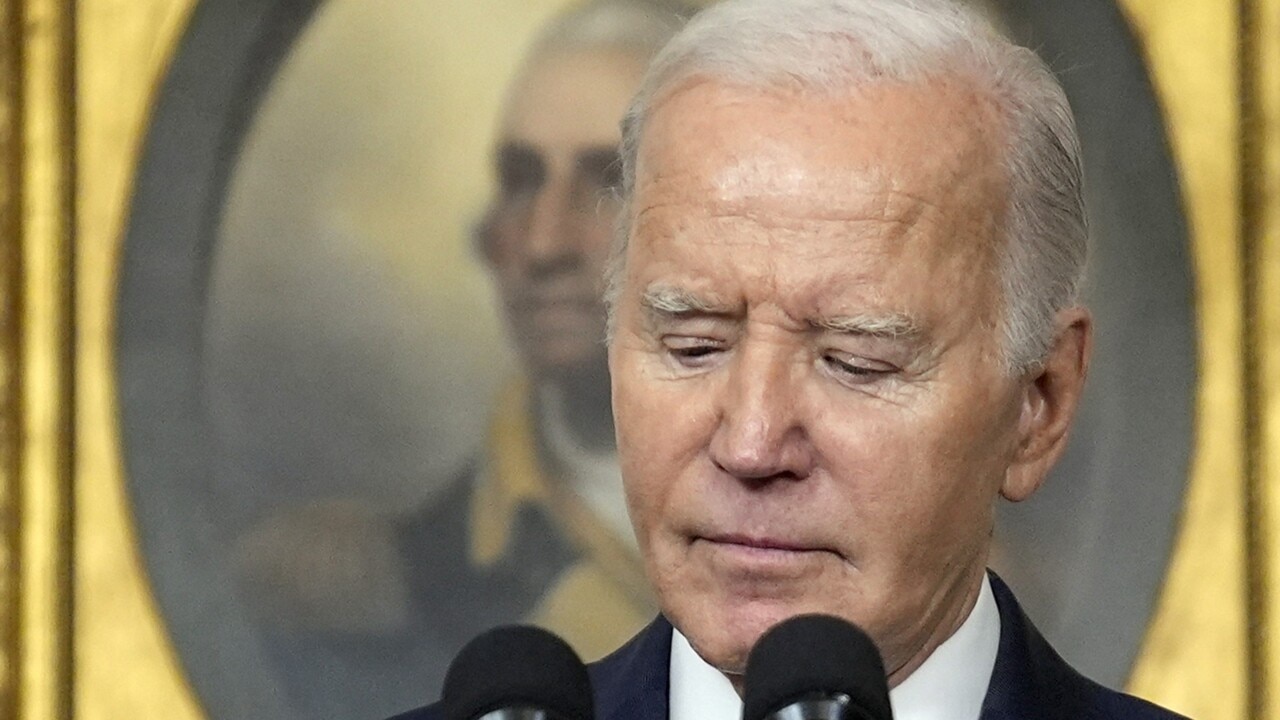
Writing in Foreign Affairs, Amos Yadlin and Udi Evental, former senior Israeli military figures, assess that: “Israel’s ground operation was only the first step, and the military effort will persist after the withdrawal of the Israel Defence Forces from Gaza.”
But there are a lot of moving parts in all this. Yaari suggests Israel is in no particular hurry to carry out the operation in Rafah but that it will happen eventually.
US officials’ clarifying messages to and about Netanyahu’s government are much more nuanced than Biden’s recently strident rhetoric. Blinken and Sullivan have been at pains to stress their continued support for Israeli war aims, the destruction of Hamas, return of the hostages and safety of Gaza civilians. The true state of the hostages is one of many difficult questions.
Media reports say that of the 134 hostages still in Gaza, Israel believes 99 are still alive. Other Israeli analysts think the number alive may be closer to 65. Hamas continues to hold 19 women aged 18 to 40. The UN itself, despite its deep institutional hostility to Israel, determined recently that Hamas did indeed engage in sickening and systematic rape and abuse of Israeli women and girls on October 7. It is tragically likely that Israeli hostages are being abused in captivity. This could even form a disincentive for Hamas to release them. Although they will be traumatised, they will one day recover their voices.
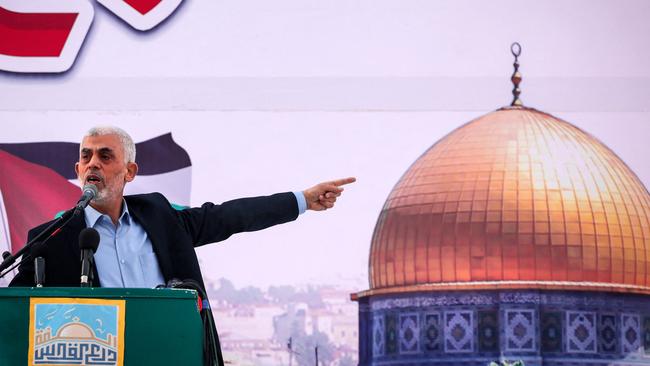
Israel will kill the Hamas leader, Sinwar, whenever he comes into view. There is said to be great internal conflict in Hamas now. Hamas didn’t get the support from Israel’s other enemies, like Hezbollah, that it predicted. Sinwar’s colleagues are said to make the argument: we’ve lost everything, now save what’s left. To which, so the story goes, he replies: we’ve lost everything, there is nothing to save, only martyrdom.
Biden and Netanyahu, on the other hand, are two old men, who don’t like each other much but have known each other, and broadly co-operated, forever. They each have debts to pay, and promises to keep, and a lot yet left to save.




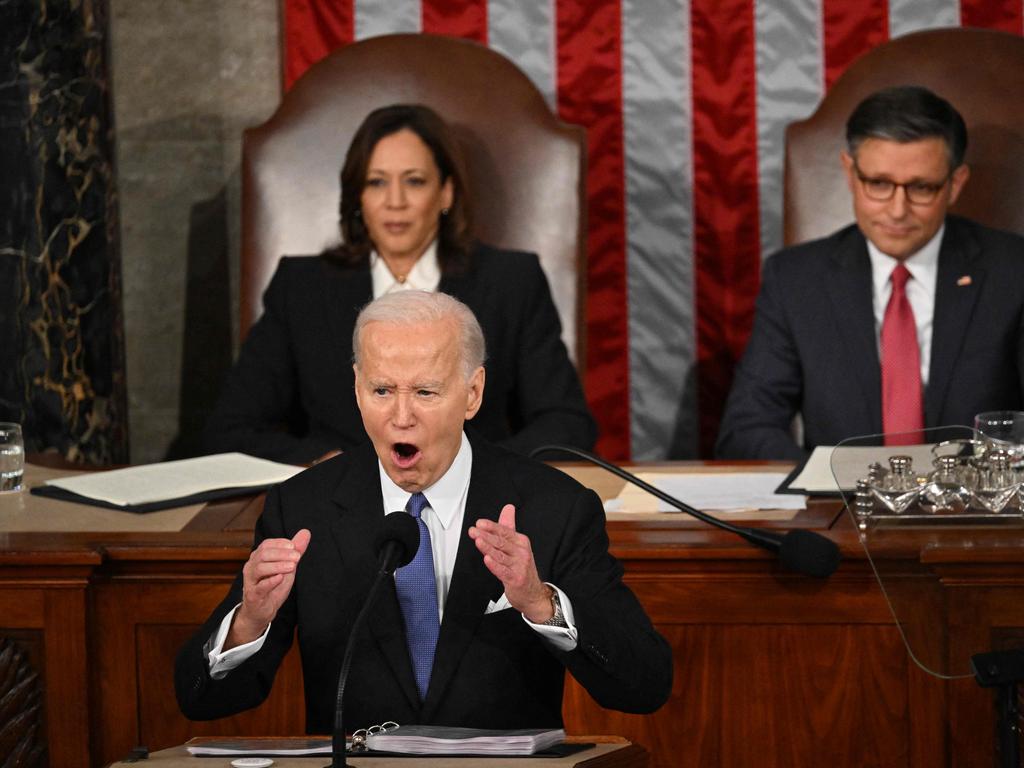
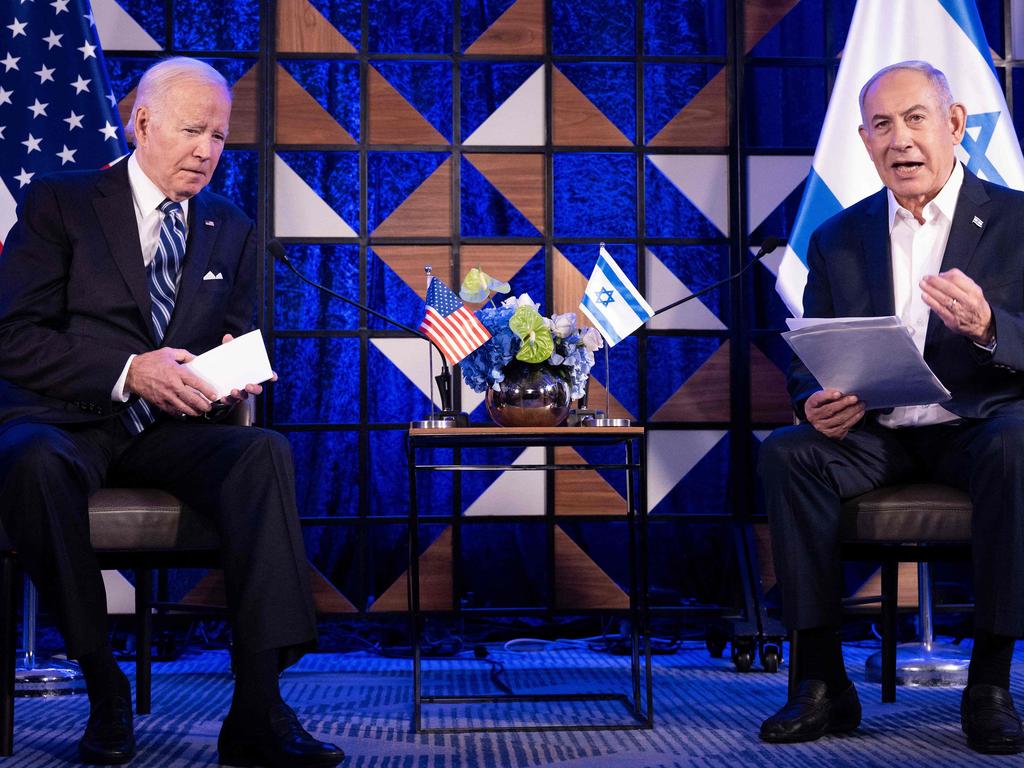


Joe Biden and Benjamin Netanyahu, the American President and the Israeli Prime Minister, two of the greatest survivors in global politics, have been at each others’ throats for the past fortnight. They never liked each other. Now they have a fractured, sour, difficult relationship.